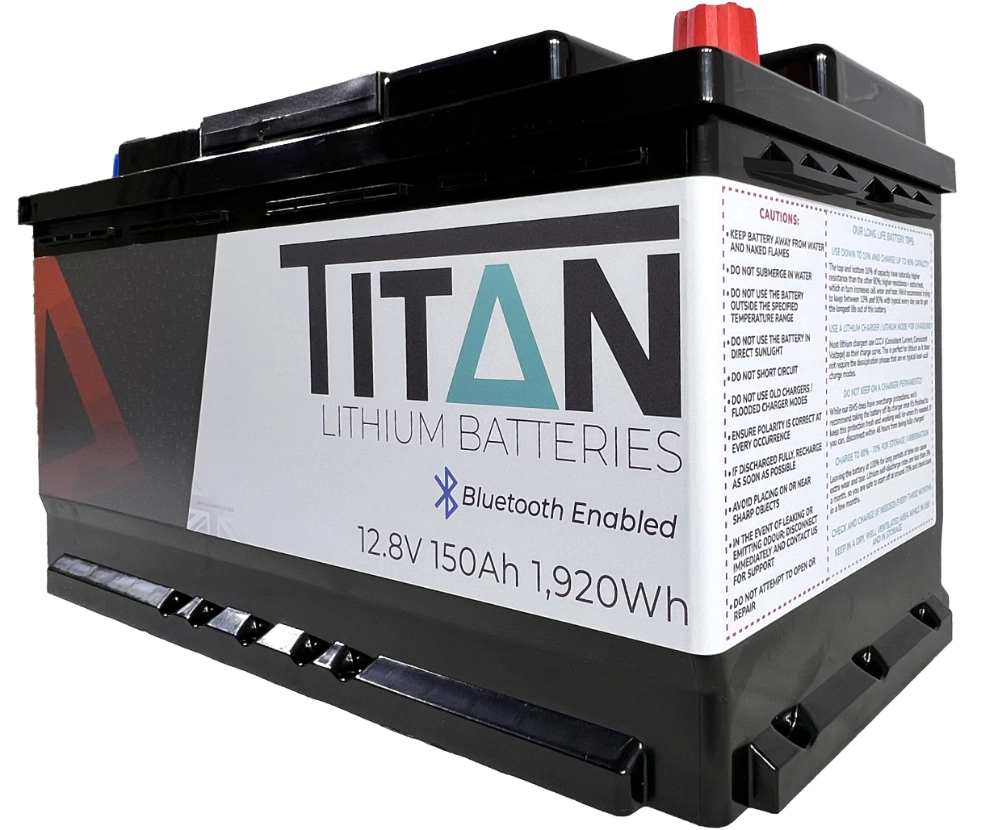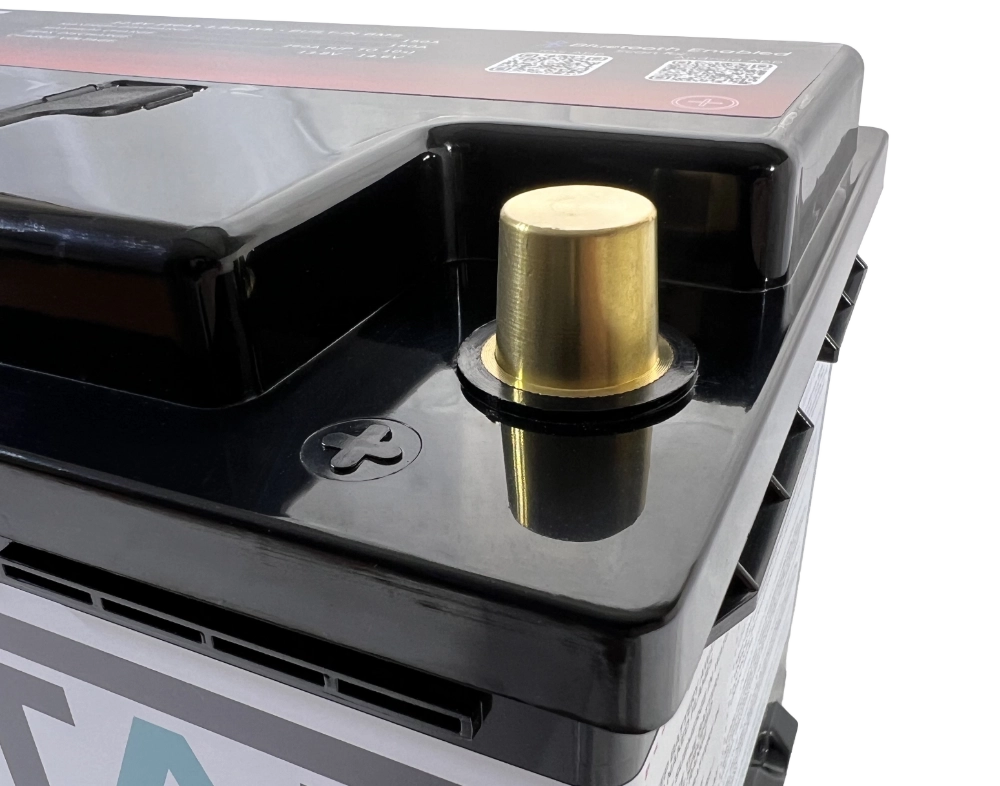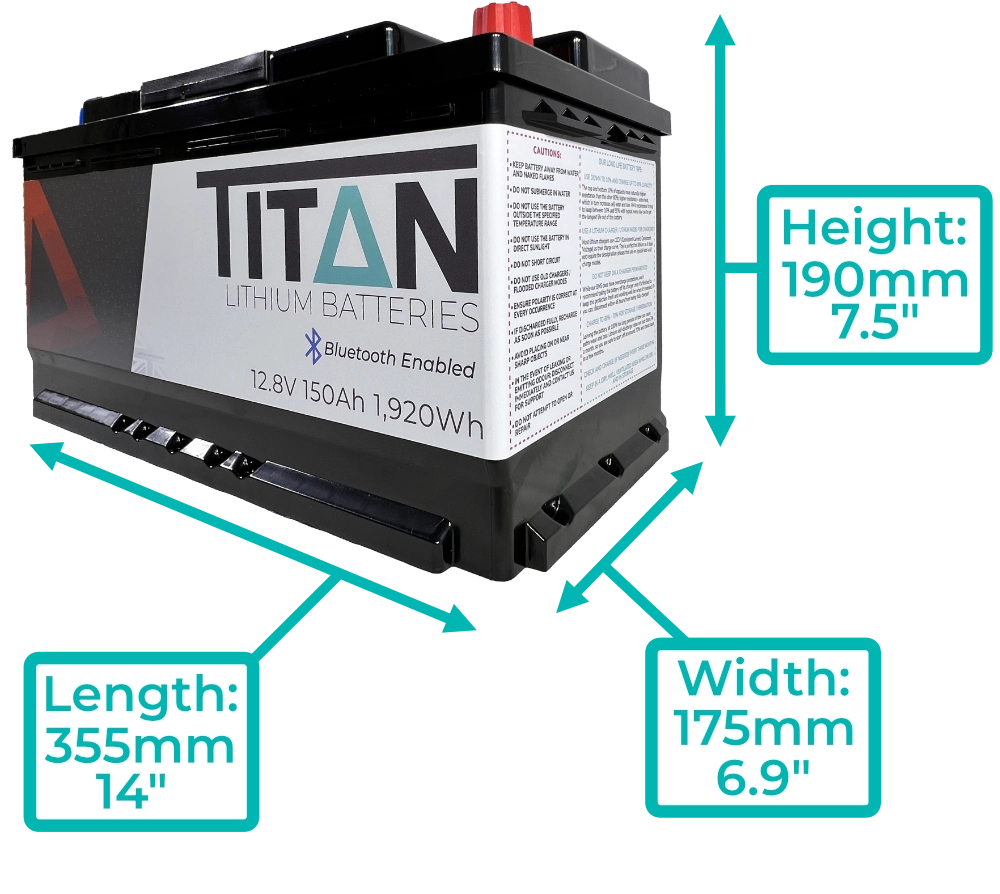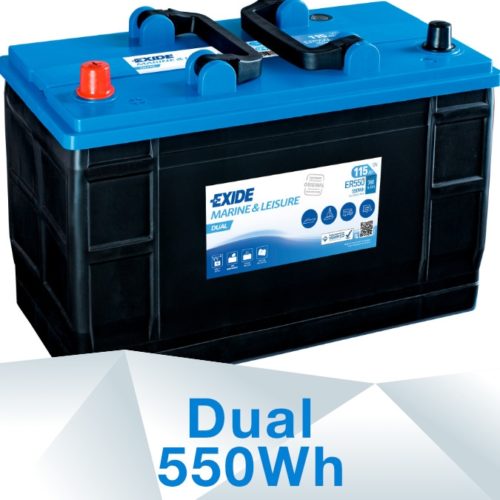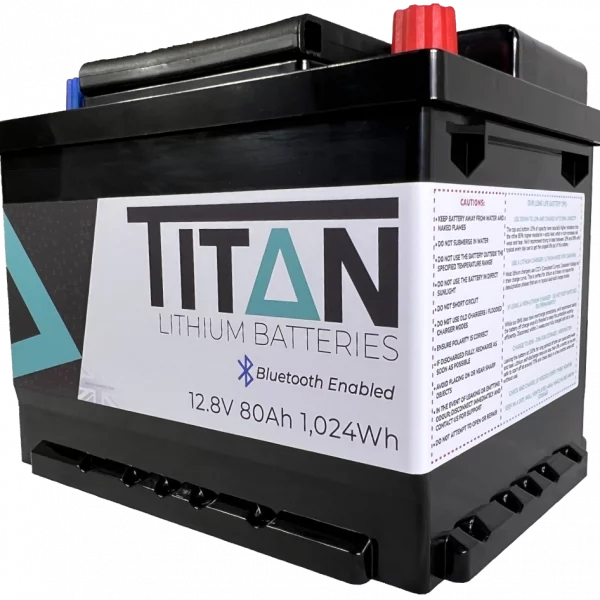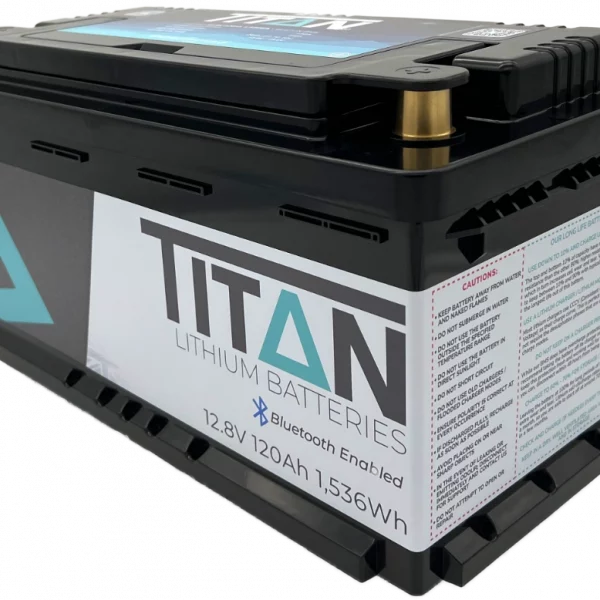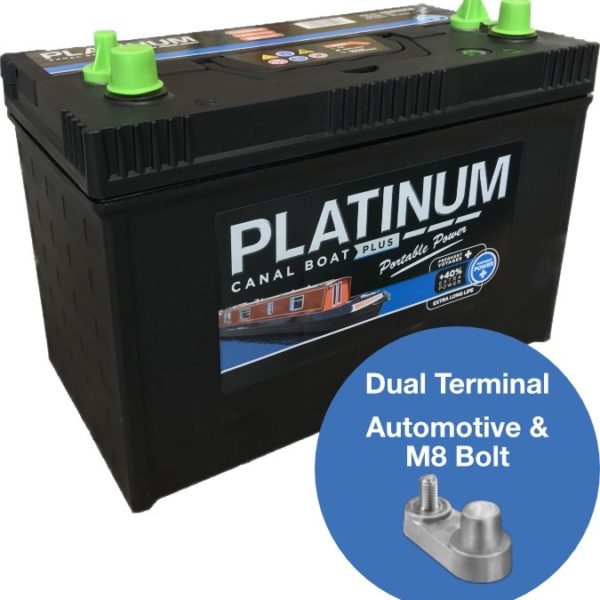Description
TITAN Lithium 12.8V 150Ah Battery
12.8V | 150Ah | 1,920Wh
355mm long x 175mm wide x 190mm high
Our flagship battery; the market-leading 150Ah. While others can achieve 100Ah or 110Ah in the same physical size, our top-quality cells, BMS, and workmanship enable us to achieve 150Ah or almost 2KWh capacity in a standard 355mm long, low-profile case. This battery is a standard DIN case (cases typically used for lead-acid batteries) for like-for-like size fitments. The case size can be referred to as an 019 – popular lead-acid models are Varta LED95, Varta LFD90, Banner 95751, and Numax DC25MF.
Our 150Ah lithium battery is the lithium diamond standard – small in size, huge energy density and extreme life expectancy. Made for those who want the best lithium technology can offer, want to get the biggest return on investment and venture off the grid for the longest. This is one of the last batteries you will buy.
This battery is 190mm high, so it will fit under seats or can be mounted on its side to achieve 175mm height if required.
This battery is also perfect for those who need a large capacity 12V power source in a condensed and lightweight package.
TITAN LiFePO4 batteries are inherently safe both chemically and thermally, and do not use rare materials like Cobalt or Nickel. In return, we get a slightly lower cell voltage of 3.2V per cell (4x cells = 12.8V), and a lower energy capacity compared to NMC (Lithium nickel manganese cobalt – the cells used in EVs), however LiFePO4 are much more stable at a chemical level, and have much higher lifespans – our batteries can last between 2,500 and 10,000 cycles (depending on use) – NMC is typically 1,000 to 2,500 cycles.
The omission of Cobalt vastly reduces the chance to start thermal runaway. Many now consider LiFePO4 to be safer than lead-acid thanks to their stability and internal control. They can be used in any orientation (e.g. on its side), although on its base will give the best performance. They contain absolutely no acid, generate no gas emissions and are recyclable.
TITAN batteries can be cycled (1 discharge + 1 charge = 1 cycle) between 2,500 to 10,000 times. The amount of cycles corresponds to how deep the discharge is – this is referred to as DOD; Depth of Discharge). If you discharge 100% of the capacity every time you use the battery, it can do this 2,500 times before needing to be replaced. The less capacity used, the higher the cycle life.
In terms of measurable life: if you discharged this battery 100% every day of the year – 2,500 cycles ÷ 365 days = 6.8 years expected lifespan
To put this into perspective, the highest quality lead-acid gel battery (gel has the best cycle count of lead-acid) can do 350-400 cycles at 80% DOD.
To get the same capacity in lead-acid, you would need THREE massive, heavy 142Ah batteries (Exide ER650) in a parallel connection to make 426Ah. Just one TITAN 150Ah can save an unpresidented amount of space, weight, extra wiring and has the added benefit of no gassing, so can be placed anywhere.
To compare accurately, we only use Wh (Watt Hour) capacity ratings – Ah (Amp Hour) ratings unfortunately do not take battery chemistry differences into account: TITAN lithium batteries use 100% of their capacity (~90% with Gel, ~75% AGM & ~60% traditional flooded lead-acid). This coupled with lithium’s inherent energy density, means our batteries have over double the useable capacity compared to lead-acid batteries.
Our most asked question – can lithium replace your current lead-acid battery? TITAN lithium batteries are designed as a direct replacement of lead-acid batteries with no need for new equipment. For more detailed information, please check out our FAQs
Our lithium batteries are for running equipment only (i.e. deep cycle use) – they are not designed for engine starting.
All TITAN lithium batteries use the highest quality lithium cells available. In doing so, we can achieve better performance, higher BMS thresholds and a better overall lifespan compared to others.
We use prismatic lithium cells (they look like a long, thin rectangle) rather than cylindrical cells. Prismatic cells are more expensive and harder to make than cylindrical, but the benefit is a higher quality, higher capacity and potent battery. As all battery cases are squares, our cells fill out all available space within which allows us to boast higher capacities over other brands that use cylindrical cells.
Cylindrical cells can waste a fair amount of internal space as circles put together will always have a gap, and are far harder to repair as they use a lot of spot welding in their design.
What about the cells getting too warm? When discharged at the full BMS allowance, we found all of our batteries to reach a maximum of ~45°C – well within the specification. For lithium to fail, the cell temperature needs to get to around 100°C. As our prismatic cells use aluminium for their outer case, any heat is dispersed with ease. And an added benefit is prismatic is a lot more efficient with heater options – heated options that use cylindrical cells means the internal cells that aren’t near the heater mat will not get sufficiently heated and can lead to early failure.
All TITAN batteries have their own BMS built-in. A Battery Management System (BMS) is a circuit board that is mounted on top of the internal cells inside the battery which is connected in between the cell terminals, and external battery terminals. The BMS controls and monitors everything with split second accuracy to ensure the battery cannot be damaged through normal day to day use. TITAN BMS currently has a market leading 11 protections built-in e.g. over discharge protection, over voltage, under voltage, temperature protection and short circuit protection to name a few.
All protections are temporary and are designed to self-reset or reset when the battery is put on a charger.
TITAN lithium’s BMS has one of the highest rated BMS allowances on the market thanks to the use of the best quality materials and internal workmanship.
Our batteries can come installed with an optional heater mat that surrounds the internal cells, which enables the internals to warm up in freezing conditions. All lithium batteries do not charge when below 0°C in order to protect the cells against damage that may occur – options with the heater installed will activate when the internal battery temperature is ~2°C or lower, and there is an incoming charge current to the battery. The heater is powered by the incoming charge from the charger, so there is no extra drain on the battery itself. The heater will then aim for 10°C, and will switch the incoming charge from the heater to the cells for the perfect charge, whatever the weather.
Battery warm up time will vary on the type of charger and the temperature, but on average, expect an added 20 minuets to your charge time.
The added heater does not affect performance in any way – the battery can and will be able to discharge in -20°C temperatures.
We recommend heated options to those who plan to use the battery in winter months, or will go to colder climates in autumn, winter and spring.
The closest capacity in a single lead-acid battery weighs a massive 70Kg (Exide AGM EP2100), and is more than four times the physical size. A 54Kg weight saving can mean a huge difference when traveling abroad, as well as offering better MPG on vehicles.
Perfect as a drop-in replacement for lead-acid batteries, our high-performance copper terminals ensure the best electrical performance while inherently providing corrosion-free contact.
Need bolt terminals instead? No problem – we can provide high-quality, hot stamped brass M8 nut & bolt adapters free of charge (just leave us a note at checkout).
Despite its high initial cost, TITAN lithium is cheaper than its lead-acid counter parts over its lifespan. Our design life is 10 years – rounded up this battery costs £750 or £75 a year. The closest capacity equivalent in lead-acid is the Exide AGM EP2100 with a design life of 4 years – currently around £520 or £130 a year (replacing the battery at the 4 year mark). This equates to £550 in savings, plus all the benefits of a lighter, smaller and more efficient battery.
While the design life of TITAN Lithium is 10 years, we expect the average user to reach 15-20 years, making it an even better investment. The realistic average life of Lead-acid is 3-5 years.
Thanks to our 99% efficiency rating, TITAN batteries utilises incoming charge energy with little waste; making them a perfect partner for solar chargers. Our batteries can accept extremely high charging amps which means they can be charged extremely quickly – from 0% to 95% in less than 2 hours (when charged over 100Amps).
This efficient charging means TITAN batteries are also perfect for home solar storage (although we’d recommend looking at our higher voltage batteries for better BMS efficiency).
At TITAN, we are so confident in our build and component quality, we have upgraded all of our batteries that have grade A cells to our full warranty that lasts the lifetime of the battery. Our parent company celebrated its 75th anniversary of continuous business this year, and we plan to stick around for the foreseeable so you can rest easy that we will be here for any issues that may arise; be it tomorrow, or in 10 or even 30 years.
Important to note: like anything in life, the more you use something, the more it wears out – batteries have always been the same, and their capacity will degrade over time. This reduction is normal and to be expected; the harder you use the battery (i.e. you discharge it fully and charge it fully often), the faster its fully charged capacity will decrease. Lithium has an incredible resiliency to capacity reduction though, and we expect a capacity loss of about 5-10% every decade with normal use and charging within specifications e.g. a brand new 150Ah would have a fully charged capacity of 165Ah, a 10 year old 150Ah would have ~150Ah and a 20 year old 150Ah would have ~135Ah when fully charged.
Battery wear or capacity loss are not valid warranty claims. Once a battery reaches a fully charged point and it does not last very long or last as long as you need it to, you will need to replace the unit.
Our warranty covers all components against premature failures caused by manufacturing faults. For more information on our warranty terms, please click here
If anything does fail prematurely, we aim to repair or replace individual problem components rather than replace the whole battery. Doing this also allows us to reduce our carbon impact and reduce waste. As we are battery specialists (we used to make batteries in the 1950s), we are adept at any and all repairs should they arise – we do ask customers to leave the repairs to us; cells and BMS’s are proprietary in design.

